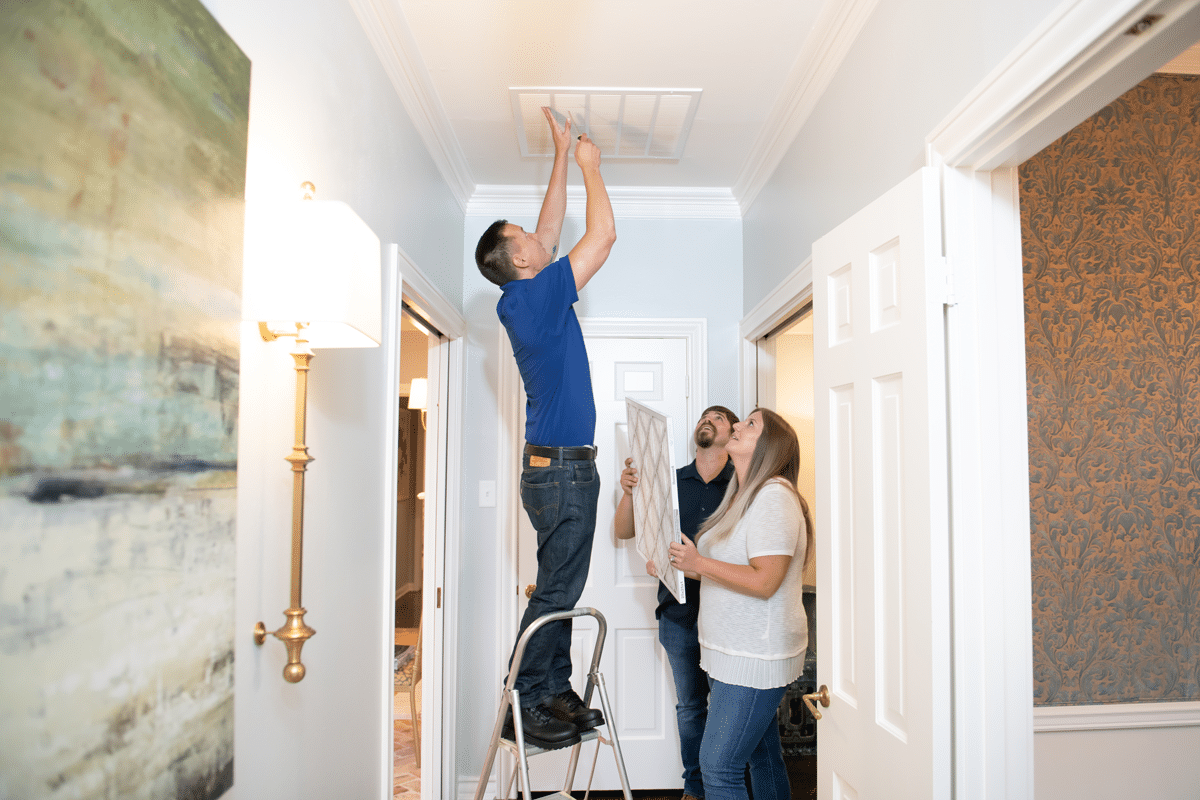The last thing you expect when you turn on your heat in the winter is to feel cold air blowing out of your HVAC unit instead of warm. However, there are some common reasons for this. Here’s what might be causing the issue and what our experienced Boston heating specialists can do to help.

Your System Hasn’t Had Time to Warm Up
When you first turn your furnace on, the air that gets blown through your ducts first is usually chilly. Your system needs a little bit of time to get warmed up, especially if it’s very cold outside. This can give you the illusion that your heater isn’t working at all, but the problem usually solves itself as your furnace continues to run.
You’ve Run Out of Heating Fuel
One of the most common – and easiest to fix – reasons your heater is blowing cold air is that you’ve run out of heating fuel. If your system uses propane to power your furnace, it can be tough to monitor how much you’re using and how much you have left. If you wake up in the morning to a chilly house, it’s possible that you used the last bit of your heating fuel over the course of the night and need to refill.
You’re Out of Refrigerant
If you have ductless heating, your system uses refrigerant instead of fuel to move heat from the environment into your space. Unlike propane, refrigerant doesn’t get used up. If you’re out of refrigerant or need your equipment “topped off,” it’s possible that there’s a leak somewhere.
An experienced HVAC contractor can troubleshoot your system to determine if low refrigerant is the reason your heater is blowing cold air and figure out the next step to a permanent solution. Typically, the leak will be identified and repaired and your refrigerant will be refilled. However, your technician may have a different recommendation based on your specific needs.
Your HVAC Filters Are Dirty
If your HVAC system’s filters are clogged or dirty, you’re probably not going to feel much warm air coming from your unit. In fact, you may not feel much airflow at all if the filters are too dirty to allow any air to pass through. If you notice that your system is blowing cool air or doesn’t seem to be blowing air as forcefully as usual, checking your filters is an easy first step. A simple clean may be all that is needed to get your system blowing warm air properly again.
Your Outdoor Unit Has Iced Over
New England winters bring plenty of snow and ice, which can accumulate on your outdoor equipment if you’re not actively making sure it’s kept clean. If your outdoor unit ices over, your system will have a difficult time generating heat. The fan motor may work, but the air it’s pumping through your home isn’t warm because the heating unit itself isn’t able to work efficiently – or at all – when covered in ice and snow.
Your Thermostat Is Set Wrong or Needs New Batteries
Another common reason that a heating system can starts to blow cold air all of a suddenly is a simple error with the thermostat. For example, you may have your thermostat set lower than you intended and you just forgot to turn it back up. Or, your thermostat may need new batteries. Anytime your heating system stops working out of the blue, be sure to take a look at your thermostat first to see if it could be an easy fix.
It’s Extremely Cold Outside
Sometimes, your HVAC system may not be able to keep up with frigid outdoor temperatures. Even working at max capacity, older heaters and ducted systems can have a difficult time fighting the cold air to keep your space warm enough. You can give your heating system a helping hand by using supplemental heating if you have it.
For example, if you have a wood stove, you can use it occasionally when the weather gets so cold that your regular system can’t keep up. Or, you can use baseboard heating in conjunction with a ductless heat pump to reduce the strain on the pump and preserve its longevity without sacrificing comfort.
Your Pilot Light Is Out
If you have a gas furnace that is blowing cold air, take a minute or two to look at the burner assembly and check if the pilot light is out. If you don’t see a small flame, the fuel your system is pumping out isn’t being burned to create heat. Not only is this a comfort issue, it’s a serious safety hazard. An unlit pilot light means gas – and deadly carbon monoxide – could be getting in your air.
If this happens, turn your main gas switch off and contact your supplier’s emergency line right away. Don’t attempt to relight the pilot light until your HVAC contractor or emergency personnel have given you the all-clear.
Your Circuit Breakers Have Tripped
Circuit breakers are made to protect your appliances from power surges. Like fuses, they work by interrupting the flow of electricity to a circuit if the sensors inside detect an overload. This often occurs at night or during storms but can happen at any time, especially during the winter when your electrical system is at max capacity.
If your system is blowing cold air or isn’t turning on at all, check your circuit breaker panel to check if any of the switches have flipped to the “OFF” position. If any have, flip them back to “ON” and see if that resolves the problem.
You Have a Malfunctioning Heat Exchanger
A heat exchanger is a critical component within a ductless system that is responsible for transferring heat from one place to another. This device works by absorbing and releasing heat into air that will either be pumped inside or outside your home depending on your system’s settings.
If your heat exchanger is cracked or malfunctioning, it will not be able to absorb heat from the outdoors. This means that no heat is released into the air passing over the exchanger, making it feel cold when it enters your space.
There Are Problems With Your Reversing Valve
In addition to heat exchangers, ductless systems also use reversing valves to switch the flow of refrigerant to warm or cool your space based on the season. If you’re feeling cool air coming out of your mini-split vents, your technician will check the reversing valve to make sure it didn’t fail to switch from cooling to heating correctly.
Replacing a reversing valve is a big job and sometimes, it’s better to just replace the entire condenser unit instead. Your HVAC contractor can give you the information you need to make the best decision.
Heater Not Working? N.E.T.R., Inc. Can Help
The last thing you want when New England temperatures start to dip is to find out that your heater isn’t working properly. At N.E.T.R., we can help you figure out what’s wrong with your furnace, central HVAC system, or ductless unit and assist you with achieving your ideal home comfort level. Contact our office today by calling (781) 933-6387.

